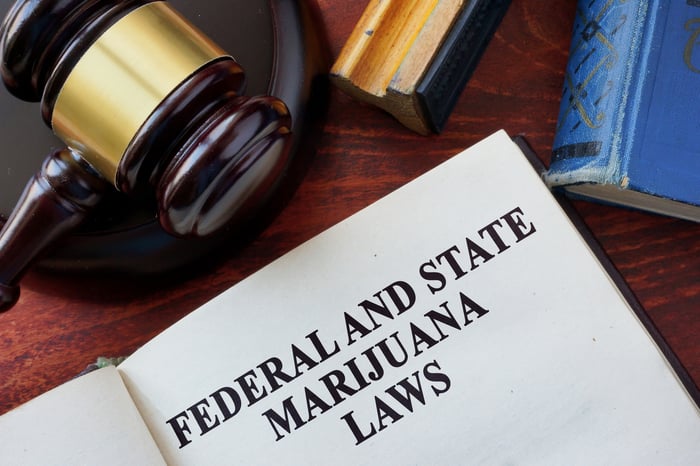When it comes to the fastest and most consistently growing industries in the United States, you'd have a hard time topping legal marijuana. According to the "Marijuana Business Factbook 2017" report issued by Marijuana Business Daily earlier this year, sales growth for legal weed in the U.S. is expected to hit 45% in 2018, and essentially quadruple between 2016 and 2021 to about $17 billion. This rapid growth has been a major lure for marijuana stock investors, and it's a big reason why many of these pot stocks have doubled or tripled in value recently.

Image source: Getty Images.
The only group that still opposes legalizing cannabis
At the heart of this surge in sales is a growing acceptance of marijuana by the American public. A recent Gallup poll showed that a record 64% of Americans now want to see pot legalized nationally. That's up from 60% in 2016, and is well ahead of the 25% who wanted to see cannabis legal back in 1995, the year before California became the first state to green-light medical cannabis for compassionate use. Support for medical weed is even higher, with a separate survey from Quinnipiac University in April 2017 finding 94% support for legalization.
What was really notable about Gallup's latest poll was the pendulum swinging to support for legalization from Republicans for the first time ever. Though the 51% support figure is still within the poll's margin for error, it signifies a definitive shift in the way the GOP is viewing pot.
With Republicans now ever so slightly favoring the expansion of marijuana, it leaves just one group in the U.S. that stands opposed to its expansion: senior citizens. Although the national pollster didn't break out the views of seniors in the latest survey, it found just 45% support for those aged 55 and up in 2016. Senior votes and a lack of younger voter turnout are big reasons why Arizona's recreational marijuana proposition failed to pass (48% to 52%) in November 2016, so their opposition to cannabis isn't something that pro-legalization enthusiasts can simply overlook.

Image source: Getty Images.
However, if there is a silver lining, it's that senior citizens have been slowly altering their stance on pot. In the combined 2003 and 2005 analysis, Gallup found that only 29% of seniors supported the idea of legalizing weed. By 2016, as noted, this was up to 45%. What's tough to tell, and what we may not know for many years to come, is whether these seniors are actually changing their views on marijuana or if we're simply seeing those who were ages 42-54 during the previous survey, and who had a more favorable view of marijuana than seniors, hold their views while moving into the senior age category.
An even bigger worry than seniors opposing pot
While the opposition of seniors to marijuana's expansion is a clear obstacle for the industry, there's actually a far bigger concern. Its name is Attorney General Jeff Sessions.
Despite 29 states having legalized medical cannabis, and voters in eight states having OK'd the sale of adult-use weed since November 2012, this progress for the industry is at risk as long as Sessions holds the highest office in the Justice Department. Sessions hasn't minced words when discussing his feelings toward marijuana. He vehemently opposes the expansion of cannabis use, even for medical purposes, and as recently as May, requested that a few of his congressional colleagues repeal the Rohrabacher-Farr Amendment, which protects medical weed business operating in legal states from federal prosecution. The uncovering of this request a month later in June demonstrates just how serious Sessions is about possibly reinforcing the superseding federal law.

Image source: Getty Images.
We've also been given shreds of evidence in recent months that a federal crackdown in some form is a real possibility. Before leaving his post as White House press secretary, Sean Spicer intimated in February that a tightening of the federal government's stance on marijuana was being considered. This was confirmed by Deputy Attorney General Rod Rosenstein (the second in command behind Sessions at the Justice Department) who noted in a recent appearance at the Heritage Foundation that they are reviewing federal marijuana policy. The tone of his speech suggested that a shift in stance was very possible.
Considering that marijuana remains a Schedule I substance at the federal level (i.e., it's illegal and has no recognized medical benefits), it's certainly within the right of the federal government to put the kibosh on the industry. And even if things continue as they are, marijuana businesses will still be dealing with unfavorable tax rates -- U.S. tax code 280E disallows corporate income tax deductions, forcing business to pay tax on their gross profits instead of net profits -- and an inability to secure basic banking services in many instances. As long as Sessions is in office, the U.S. marijuana industry should be off-limits for your hard-earned money.




